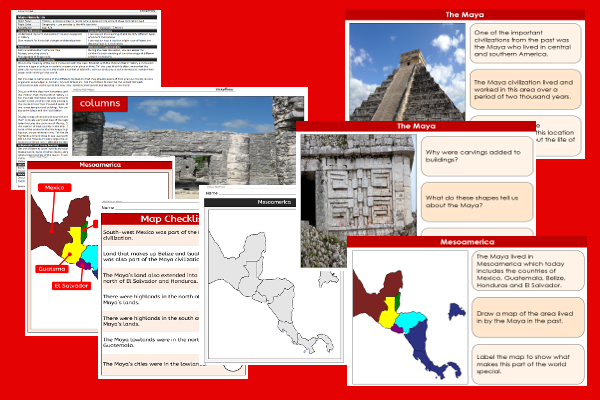Home > Key Stage Two > History > The Maya
Lesson One – Maya Homelands

This history teaching pack for Key Stage Two gets the children to produce a map to record and illustrate where people in the ancient Maya civilization lived and worked in the past.
The class can identify and explain how the location of the Mayan civilization impacted how it grew and developed over time such as access to natural resources and protection from attackers.
Download this teaching pack including a lesson plan, classroom activities and an interactive presentation to teach the children to produce a map to record and illustrate where people in the ancient Maya civilization lived and worked in the past
Activities in this teaching pack include a set of display posters to describe some of the buildings that have been left behind by the Mayan civilization, a template to label a map of different locations in Mesoamerica and a worksheet to record and label a map showing the extent of the Maya civilization from the past.
The interactive presentation gets the children to explore the location of the Maya civilization in the past and suggest reasons as to why the society grew and developed over time.
This lesson is part of a history scheme of work to research describe and present information and facts about the culture, traditions and achievements of the Maya civilization in the past . There are teaching activities for shared learning, differentiated worksheets to support independent learning and an interactive presentation to introduce concepts and key skills.
-

Theme Park Visit
Practise identifying and calculating the timing and duration of rides and events when visiting a theme park on a special family trip
-

Family Holiday Trips
Identify and record how to compose and publish recounts using adverbials of time and place to describe family holidays to different places in the world
-

Money Multiplication
Explain and model how to use standard written calculation methods to multiply money amounts in pounds and pence when solving number problems
-

Sport Teams
Explain and model how to use brackets and dashes to add extra information to sentences describing how to play sports and games as part of a team
